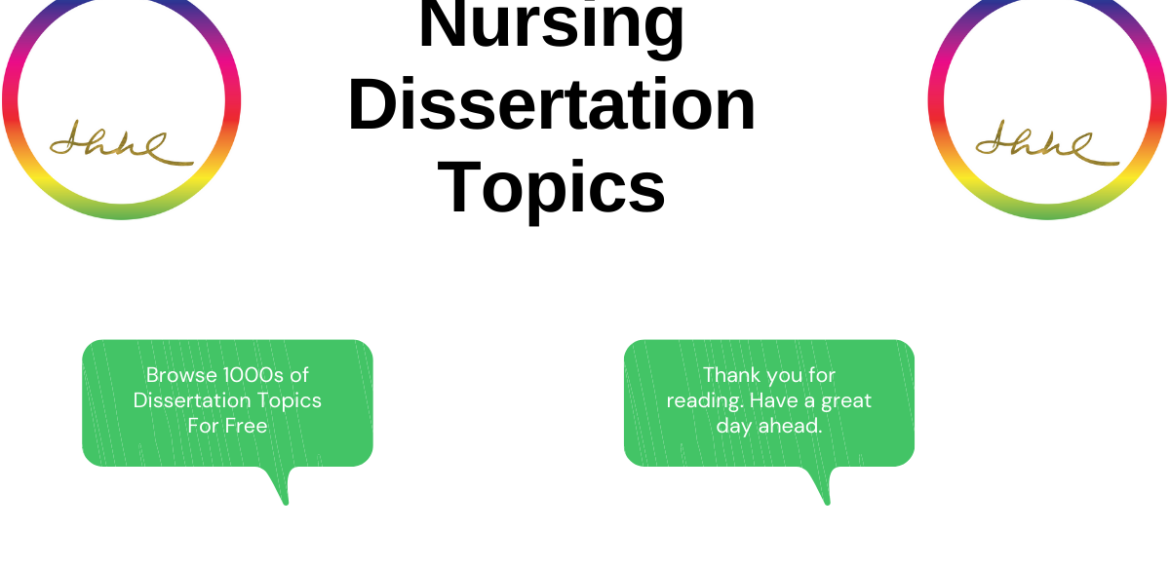Nursing Dissertation Topics
A dissertation or thesis, as the written form of one’s research, provides well-documented discourse on a specific subject and is especially important for higher academic qualifications. One of the most critical aspects of a dissertation is its scope and subject matter specificity. It is critical to choose a relevant dissertation topic because this is the first step toward completing an exhaustive, in-depth study that is unique. In comparison to a book, a dissertation is much more focused on specialized knowledge within a single field of study. This article can assist you in developing ideas for your nursing and medicine dissertations. It makes recommendations for research topics in medical care and clinical management, as well as public health and pandemic preparedness.
Editingarsenal has compiled a list of some of the most popular and common dissertation topics from a variety of academic disciplines, so you can pick and choose what to write about. If you need dissertation editing assistance , don’t hesitate to contact one of our qualified and experienced editors and proofreaders.
Covid 19 Nursing Topics
- NHS Nurses as ‘angel’ and ‘hero’: An empowering or crippling discourse?
- A Health Care Policy Analysis The United Kingdom’s response to COVID-19
- Health and safety management in the event of a pandemic: A comprehensive examination.
- A qualitative study of healthcare professionals’ experiences working in the United Kingdom during the coronavirus outbreak.
- A qualitative examination of the psychological experiences of child inpatients infected with COVID-19.
- From a public health perspective, examining the associations between COVID-19 susceptibility and socioeconomic status.
- The purpose of this study is to determine the factors that influence vaccine acceptance/rejection for COVID-19.
- Examining ethical dilemmas encountered by healthcare professionals during COVID-19: Developing policies that promote best practises
- Enhancing the NHS’s Pandemic Resilience: A Qualitative Study of Clinical Managers’ Perspectives.
Evidence-Based Practice Topics
- Using evidence-based practises to create change models.
- Leadership and ethics are critical components of evidence-based nursing practice.
- Guidelines that promote high-quality healthcare through an evidence-based approach.
- As a theoretical and practical approach to nursing interventions, based on evidence.
- Evidence-based medicine is concerned with the application of evidence and the practice of evidence-based medicine.
- The role and significance of reflection in evidence-based practice.
- The effectiveness of evidence-based practice in healthcare is examined.
- Disease management through the use of evidence-based medicine.
- Initiation of an evidence-based nursing programme to meet the health care needs of elderly cancer patients.
- Clinical practice requires knowledge management and evidence-based practice.
Public Health Topics
- Evaluating the impact of health promotion interventions on public health in the United Kingdom.
- Contamination of drinking water in developing countries and its consequences for public health
- Evaluating the public health effects of natural disasters.
- Exercise habits and their epidemiological associations with cardiovascular risk.
- Public health policy plays a critical role in preventing childhood obesity.
- Poverty is a public health problem because it contributes to the spread of childhood diseases.
- Public health responses and strategies for cancer prevention.
- Diabetes as a public health problem and the associated lifestyle interventions.
- Teenage alcoholism and binge drinking as a public health issue.
Clinical Management Topics
- Clinical management of prostate cancer patients raises a number of issues and risks.
- Adult intensive care unit patients: new directions in management.
- Management issues in the care of elderly patients are perceived.
- The most effective management strategy for post-traumatic stress disorder patients.
- Management and outcome of acute ischemic stroke.
- In correctional facilities, substance abuse is managed clinically and psychosocially.
- Self-assessment and decision-making in surgical patients: Surgical case management approaches.
- Pain management and care strategies for chronic and acute pain patients.
- Clinically applicable interventions for the management and control of infectious diseases.
- Clinical management of patients with cardiovascular disease and hypertension who are hospitalised.
Environmental Health Topics
- Air pollution and lung diseases are prevalent in larger cities.
- Environmental chemicals and their adverse effects on human reproductive health
- Environmental health risks posed by radioactive wastes are assessed.
- Sanitary hygiene in developing countries: environmental health implications
- Perspectives on hazardous waste disposal from an environmental health standpoint.
- Prevention of arsenic and lead poisoning: An environmental health study.
- Heart rate changes as a result of passive smoking exposure – a public health concern
- Food poisoning and food-related illnesses in various cities: environmental health perspectives
- The benefits of being aware of significant environmental health hazards.
- The community’s involvement and the citizens’ role in raising awareness about environmental health issues.
Midwifery Topics
- The role of the midwife in high-risk pregnancies.
- Nurse-midwife intervention team that assists with caesarean section management.
- In the United Kingdom, this is the model of care that is used in standard midwifery practise.
- Improving pregnancy outcomes and care through the use of midwives.
- Do midwives influence pregnant women’s decision-making and assist them in making informed choices?
- Factors affecting midwives’ clinical competence.
- Pregnant women who have substance abuse problems: descriptions and perceptions of midwives.
- The risks to women’s health associated with postpartum depression and the role of the midwife.
- The long-term effects of social support and midwifery care during pregnancy.
- Midwives’ attitudes toward patient confidentiality in the United Kingdom.
Community Nursing Topics
- Elderly outpatient care and community nursing services are available.
- Assessment of children’s nutritional status is a critical component of community nursing.
- Integrated community nursing service provisions and their impact on individual health care costs.
- Health promotion through community nursing practise.
- The roles of GPs, nurses, social workers, and policymakers are collaborative in a community nursing centre.
- Patients requiring post-operative nursing care.
- Community nursing’s role in improving the elderly’s quality of life.
- Community nursing is a type of nursing that is used to care for elderly individuals who are afflicted with chronic illnesses.
- A comparative study of residents’ nursing and health care needs in a variety of cities.
- A review of community nursing services available to pregnant women and new mothers.
Healthcare Organizations Topics
- Research funding at the National Institutes of Health has been on an upward trajectory.
- The UK’s Department of Health is heavily involved in public health policies.
- Policies and approaches to child development adopted by the WHO.
- The effectiveness and efficiency of the National Health Service in providing care for the elderly.
- Strategic healthcare policies and plans developed by the National Health Service (NHS).
- There are new policies and services for healthcare organisations.
- WHO’s attention to the healthcare needs of developing countries is quite extensive.
- The organisational dynamics, culture, and authority of the National Health Service.
- Perspectives on strategic management of international health organisations.
- A study of healthcare costs and plans in a number of nations.
Mental Health Topics
- The efficacy of psychiatric treatment and medication in patients with schizophrenia.
- Providing mental health services to older adults who are depressed or lonely.
- The youth and adolescent drinking and drug use problem, as well as its relationship to mental health.
- Recognize the mental health needs of women who have been sexually and physically abused.
- A comparative study of urban and rural societies’ mental health issues.
- Due to social pressures, gays, lesbians, and bisexuals experience stress and mental illness.
- Unemployment as a contributing factor to the escalation of mental health problems.
- Individuals’ socioeconomic backgrounds and evidence of mental illness.
- The relationship between mental illnesses and suicides among urban youth.
- Recognize the legal ramifications of mental health research.
Occupational Health and Safety Topics
- Techniques for avoiding workplace injuries and illnesses.
- The connection between workplace safety, employee stress, and employee health.
- Employee empowerment through the implementation of effective health interventions.
- Managing the occupational health and safety requirements of employees in the pharmaceutical industry.
- Concerns about occupational health and safety in a global economy, as well as increased job pressure.
- Aspects of factory worker health and safety.
- The growing importance of occupational health and safety issues in industrialised societies.
- Interventions in occupational health psychology and stress management.
- A multinational corporation’s (Glaxo) organisational initiative to ensure workplace health and safety: A case study.
- Long-term effects of occupational stress on police officers.
Nursing Theories and Models Topics
- Nursing perspectives that are applied to nursing practise and interventions.
- Clinical decision-making based on nursing theories.
- The Roper Logan Tierney model and its application in nursing practise are discussed, along with a case study of an emergency patient.
- Utilizing the McGill Model of Nursing to gain a better understanding of holistic nursing practise.
- The purpose of this research is to determine the role and significance of nursing models and theories in clinical interventions, as well as the efficacy of conceptual models in nursing practise.
- Neuman’s systems model is compared to the Roper Logan Tierney model and the McGill nursing model.
- The roles and models of nursing practise of nurses in light of changing health care and nursing needs.
- The significance of reflection in nursing theory and practise.
- Neuman systems model interventions in public health nursing.
- In nursing practise, the Roper Logan Tierney model is being operationalized for the treatment and care of psychiatric patients.







